Welcome to La Peña! Promoting social justice & intercultural understanding through the arts since 1975.

- This event has passed.
Capoeira Angola
September 5, 2022 @ 7:00 pm - 9:00 pm
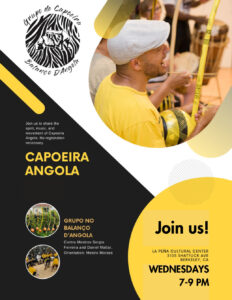 Wednesdays, 7:00pm – 9:00pm
Wednesdays, 7:00pm – 9:00pm
January 18th – December 6th, 2023
In person at La Peña Cultural Center
For more information, contact Sergio Bitencourt at sergiobitencourt81@gmail.com.
- Class Dues:
- $25-35 sliding scale per class
- $80-120 sliding scale monthly (includes Monday and Saturday classes in our West Oakland location)
Come experience the spirit, music, and movement of Capoeira Angola with GRUPO NO BALANÇO D’ANGOLA! Capoeira No Balanço D’Angola aims to preserve and protect the Afro-Brazilian rhythms, movements, and principles of Capoeira Angola as a tool of social integration. Classes are taught by Contra Mestre Sergio Ferreira Bittencourt, Contra Mestre Daniel Mattar, and Jeff Ramirez Leopando.
WHAT TO EXPECT:
Our classes are open to anyone, especially those who have never tried capoeira before! Please dress in comfortable shirt and pants, with a shirt that you’re able to tuck into your pants. Ideally, please wear sneakers with minimal tread on their soles (like low cut Vans or Converse sneakers), although any sneaker is fine.
We begin our class with one hour of music practice. Our instructors and your classmates will help you learn the rhythm, songs, and instruments of capoeira angola, including the 3 types of berimbaus (gunga, medio, and viola), the atabaque drum, the pandeiro, the agogô and the reco-reco. We sing capoeira angola songs in Brazilian Portuguese, so it’s a great way to learn or practice Portuguese! After music class, we do an hour of movement class, where we warm up our bodies then practice capoeira moves and sequences, both individually and two by two. Finally we end class by playing games together. Capoeira games are a great way to be present with your body, creating a spontaneous dialogue with your opponent inside the “roda,” or “ring”.
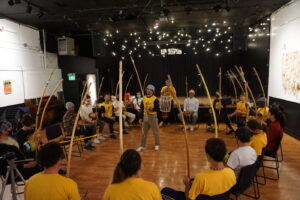
GRUPO DE CAPOEIRA NO BALANÇO D’ANGOLA (NBDA):
NBDA is a capoeira angola group based in Berkeley and West Oakland founded by Contramestre Sergio Ferreira in 2015. Our group receives orientation from Mestre Moraes, founder of the Grupo Capoeira Angola of Pelourinho (GCAP) in Salvador, Brazil. Mestre Moraes is a PhD candidate at the Federal University of Bahia Brazil, a Grammy nominated musician, and a student of Mestre Pastinha, the father of capoeira angola, as well as a student of Mestre João Grande.
Our group name, No Balanço D’Angola translates to “in the Angola rhythm.” We are honored to have been meeting at La Peña since our group’s founding. We believe La Peña’s spirit of resistance and community building provides the perfect atmosphere to practice the tradition of Capoeira Angola in Berkeley. Follow us at @nbda_angola
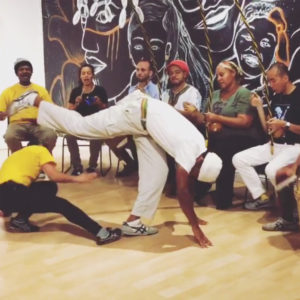 ABOUT CAPOEIRA ANGOLA:
ABOUT CAPOEIRA ANGOLA:
Capoeira angola, a martial art and ritual combat dance, is one of the major expressions of an African, specifically Kongo-Angolan, continuum in Brazil. It is believed that its origins may go as far back as the 16th century, when Africans from western Central Africa were enslaved and taken to Brazil, specifically Salvador and the surrounding Recôncavo region.
In its history and practice, capoeira angola reflects the philosophy and aesthetics of its origins. Similar to many traditional African traditions, there are no clear-cut distinctions between the sacred and secular, work and play, fight and fun. Capoeira angola integrates music, movement, theatrics, play, martial arts, philosophy, and spirituality. In the past, Capoeira angola has been passed down from master (“Mestre”) to student orally.
Our group’s Mestre, Mestre Moraes, describes Capoeira Angola’s philosophy as the following: “The capoeira ring, whose geometric form facilitates the propagation of energy, is one of the symbolic representations of the ‘macro’ world. The movements we make inside this ring symbolise the adversities we encounter in life, which we often don’t know how to deal with. In the game of life, our opponents, in most cases, know nothing of capoeira, but have movements peculiar to their own game, which we should be able to interpret and understand in their context, taking the capoeira ring as a point of reference. Playing in the ring, we succeed in establishing a fusion between playful elements and respect for the other person. But the ring isn’t reality: the world is. If we win in this ring, we can take the other one too!”
INSTRUCTORS:
Contramestre Sergio Ferreira is from Belo Horizonte, Brazil and received the title of Contramestre in 2021. He began training Capoeira Angola at age 11, first with Mestre Baiano, then with Mestre Dois de Ouro from whom he learned the art of making berimbaus. At age 16, he joined GCAP Belo Horizonte under the leadership of Mestre Leo and Mestre Rene. In 2003, he helped found the group Camujerê together with Mestre Rene, Treinel Jorge, and the late Ezequiel Emilio. Three years after moving to the Bay Area, he founded the No Balanço D’Angola group (NBDA) in 2015.
Contra Mestre Daniel Mattar is from Rio de Janeiro, Brazil and received the title of Contramestre in 2019. He began seriously practicing Capoeira Angola at age 23, first with Mestre Marrom in Rio. He practiced at FICA in West Oakland from 2002 to 2020, first studying under Mestre Rogerio then serving as lead instructor with Mestre Jurandir’s guidance for more than a decade. Contramestre Daniel joined NBDA in 2020.
Both Contramestre Sergio and Contramestre Daniel work as deckhands, proudly continuing the tradition of capoeiristas with maritime careers.
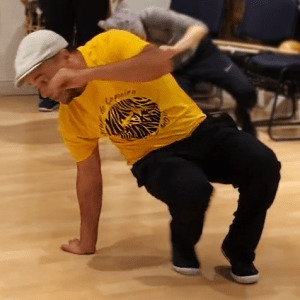
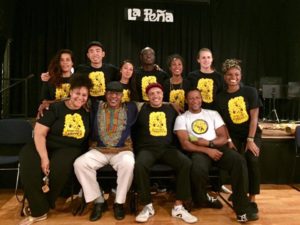
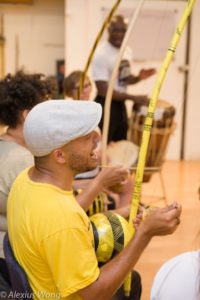
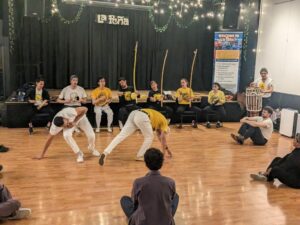
 Wednesdays, 7:00pm – 9:00pm
Wednesdays, 7:00pm – 9:00pm
January 18th – December 6th, 2023
In person at La Peña Cultural Center
For more information, contact Sergio Bitencourt at sergiobitencourt81@gmail.com.
- Class Dues:
- $25-35 sliding scale per class
- $80-120 sliding scale monthly (includes Monday and Saturday classes in our West Oakland location)
Come experience the spirit, music, and movement of Capoeira Angola with GRUPO NO BALANÇO D’ANGOLA! Capoeira No Balanço D’Angola aims to preserve and protect the Afro-Brazilian rhythms, movements, and principles of Capoeira Angola as a tool of social integration. Classes are taught by Contra Mestre Sergio Ferreira Bittencourt, Contra Mestre Daniel Mattar, and Jeff Ramirez Leopando.
WHAT TO EXPECT:
Our classes are open to anyone, especially those who have never tried capoeira before! Please dress in comfortable shirt and pants, with a shirt that you’re able to tuck into your pants. Ideally, please wear sneakers with minimal tread on their soles (like low cut Vans or Converse sneakers), although any sneaker is fine.
We begin our class with one hour of music practice. Our instructors and your classmates will help you learn the rhythm, songs, and instruments of capoeira angola, including the 3 types of berimbaus (gunga, medio, and viola), the atabaque drum, the pandeiro, the agogô and the reco-reco. We sing capoeira angola songs in Brazilian Portuguese, so it’s a great way to learn or practice Portuguese! After music class, we do an hour of movement class, where we warm up our bodies then practice capoeira moves and sequences, both individually and two by two. Finally we end class by playing games together. Capoeira games are a great way to be present with your body, creating a spontaneous dialogue with your opponent inside the “roda,” or “ring”.

GRUPO DE CAPOEIRA NO BALANÇO D’ANGOLA (NBDA):
NBDA is a capoeira angola group based in Berkeley and West Oakland founded by Contramestre Sergio Ferreira in 2015. Our group receives orientation from Mestre Moraes, founder of the Grupo Capoeira Angola of Pelourinho (GCAP) in Salvador, Brazil. Mestre Moraes is a PhD candidate at the Federal University of Bahia Brazil, a Grammy nominated musician, and a student of Mestre Pastinha, the father of capoeira angola, as well as a student of Mestre João Grande.
Our group name, No Balanço D’Angola translates to “in the Angola rhythm.” We are honored to have been meeting at La Peña since our group’s founding. We believe La Peña’s spirit of resistance and community building provides the perfect atmosphere to practice the tradition of Capoeira Angola in Berkeley. Follow us at @nbda_angola
 ABOUT CAPOEIRA ANGOLA:
ABOUT CAPOEIRA ANGOLA:
Capoeira angola, a martial art and ritual combat dance, is one of the major expressions of an African, specifically Kongo-Angolan, continuum in Brazil. It is believed that its origins may go as far back as the 16th century, when Africans from western Central Africa were enslaved and taken to Brazil, specifically Salvador and the surrounding Recôncavo region.
In its history and practice, capoeira angola reflects the philosophy and aesthetics of its origins. Similar to many traditional African traditions, there are no clear-cut distinctions between the sacred and secular, work and play, fight and fun. Capoeira angola integrates music, movement, theatrics, play, martial arts, philosophy, and spirituality. In the past, Capoeira angola has been passed down from master (“Mestre”) to student orally.
Our group’s Mestre, Mestre Moraes, describes Capoeira Angola’s philosophy as the following: “The capoeira ring, whose geometric form facilitates the propagation of energy, is one of the symbolic representations of the ‘macro’ world. The movements we make inside this ring symbolise the adversities we encounter in life, which we often don’t know how to deal with. In the game of life, our opponents, in most cases, know nothing of capoeira, but have movements peculiar to their own game, which we should be able to interpret and understand in their context, taking the capoeira ring as a point of reference. Playing in the ring, we succeed in establishing a fusion between playful elements and respect for the other person. But the ring isn’t reality: the world is. If we win in this ring, we can take the other one too!”
INSTRUCTORS:
Contramestre Sergio Ferreira is from Belo Horizonte, Brazil and received the title of Contramestre in 2021. He began training Capoeira Angola at age 11, first with Mestre Baiano, then with Mestre Dois de Ouro from whom he learned the art of making berimbaus. At age 16, he joined GCAP Belo Horizonte under the leadership of Mestre Leo and Mestre Rene. In 2003, he helped found the group Camujerê together with Mestre Rene, Treinel Jorge, and the late Ezequiel Emilio. Three years after moving to the Bay Area, he founded the No Balanço D’Angola group (NBDA) in 2015.
Contra Mestre Daniel Mattar is from Rio de Janeiro, Brazil and received the title of Contramestre in 2019. He began seriously practicing Capoeira Angola at age 23, first with Mestre Marrom in Rio. He practiced at FICA in West Oakland from 2002 to 2020, first studying under Mestre Rogerio then serving as lead instructor with Mestre Jurandir’s guidance for more than a decade. Contramestre Daniel joined NBDA in 2020.
Both Contramestre Sergio and Contramestre Daniel work as deckhands, proudly continuing the tradition of capoeiristas with maritime careers.



